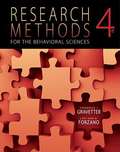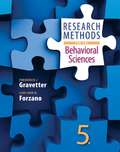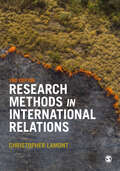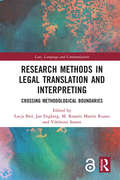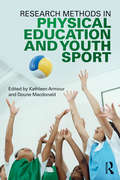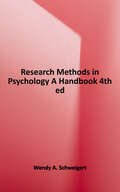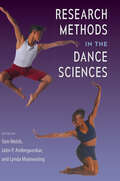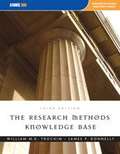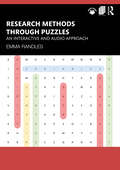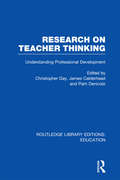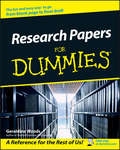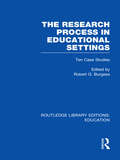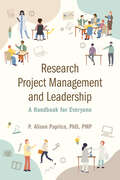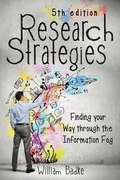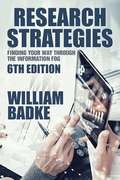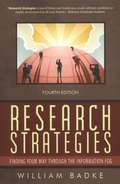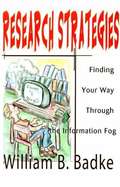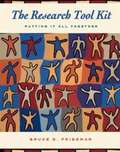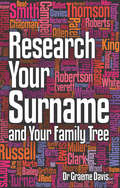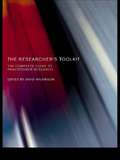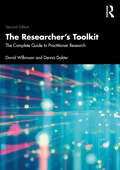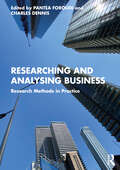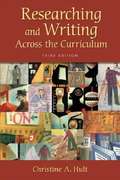- Table View
- List View
Research Methods for the Behavioral Sciences (4th Edition)
by Frederick J. Gravetter Lori-Ann B. ForzanoBestselling statistics author, Fredrick J. Gravetter, and co-author Lori-Ann B. Forzano have written a text for research methods that helps students see how interesting and exciting experimental and non-experimental research can be. Inviting and conversational, RESEARCH METHODS FOR THE BEHAVIORAL SCIENCES, Fourth Edition, leads students through the research process from start to finish. The text opens with tips and strategies for generating research ideas, moves to selecting measures and participants, and then offers an examination of research strategy and design. This step-by-step approach emphasizes the decisions researchers must make at each stage of the process. The authors avoid a "cookbook" approach to the facts by linking terminology with applied concepts; their "lecture in a book" style makes the text accessible to students by emphasizing discussion and explanation of topics. Each chapter ends with a set of student exercises and activities. Examples and content throughout the book reflect the most current APA guidelines.
Research Methods for the Behavioral Sciences, 5th Edition
by Frederick J Gravetter Lori-Ann B. ForzanoRESEARCH METHODS FOR THE BEHAVIORAL SCIENCES, Fifth Edition, helps readers see how interesting and exciting experimental and nonexperimental research can be. Inviting and conversational, the book leads readers through the research process from start to finish. It begins with tips and strategies for generating research ideas, moves to selecting measures and participants, and then offers an examination of research strategy and design. This step-by-step presentation emphasizes the decisions researchers must make at each stage of the process. The authors avoid a ""cookbook"" approach by linking terminology with applied concepts; their ""lecture in a book"" style makes the text accessible by emphasizing discussion and explanation of topics. Examples and content throughout the book reflect the most current APA guidelines.
Research Methods in International Relations
by Christopher LamontThe only guide to conducting research in International Relations. Covering the full breadth of methods in IR with unrivalled clarity, this best-selling textbook takes you through the entire process of doing research, from honing your question to writing up the dissertation. The engaging and jargon-free style demystifies the process of doing research, whilst helping you develop a comprehensive understanding of the strengths and limitations of different methods and methodologies. This second edition comes with new chapters on conducting interviews and discourse analysis, as well as expanded coverage of qualitative and quantitative methods. Packed with examples, it explores the breadth of IR research today, from the long-lasting impact of colonialism to migration policy; climate change negotiations to international aid. Covering the most cutting-edge methodological developments, including critical realism, feminist, and postcolonial approaches, it helps you understand and apply research methods in world politics. This practical introduction is essential reading for anyone setting out on their International Relations research project for the first time, at undergraduate and postgraduate levels. Christopher Lamont is Assistant Dean of E-Track Programs and Associate Professor of International Relations at Tokyo International University, Japan.
Research Methods in International Relations
by Christopher LamontThe only guide to conducting research in International Relations. Covering the full breadth of methods in IR with unrivalled clarity, this best-selling textbook takes you through the entire process of doing research, from honing your question to writing up the dissertation. The engaging and jargon-free style demystifies the process of doing research, whilst helping you develop a comprehensive understanding of the strengths and limitations of different methods and methodologies. This second edition comes with new chapters on conducting interviews and discourse analysis, as well as expanded coverage of qualitative and quantitative methods. Packed with examples, it explores the breadth of IR research today, from the long-lasting impact of colonialism to migration policy; climate change negotiations to international aid. Covering the most cutting-edge methodological developments, including critical realism, feminist, and postcolonial approaches, it helps you understand and apply research methods in world politics. This practical introduction is essential reading for anyone setting out on their International Relations research project for the first time, at undergraduate and postgraduate levels. Christopher Lamont is Assistant Dean of E-Track Programs and Associate Professor of International Relations at Tokyo International University, Japan.
Research Methods in Legal Translation and Interpreting: Crossing Methodological Boundaries (Law, Language and Communication)
by Łucja Biel Vilelmini Sosoni Jan Engberg Rosario Martín RuanoThe field of legal translation and interpreting has strongly expanded over recent years. As it has developed into an independent branch of Translation Studies, this book advocates for a substantiated discussion of methods and methodology, as well as knowledge about the variety of approaches actually applied in the field. It is argued that, complex and multifaceted as it is, legal translation calls for research that might cross boundaries across research approaches and disciplines in order to shed light on the many facets of this social practice. The volume addresses the challenge of methodological consolidation, triangulation and refinement. The work presents examples of the variety of theoretical approaches which have been developed in the discipline and of the methodological sophistication which is currently being called for. In this regard, by combining different perspectives, they expand our understanding of the roles played by legal translators and interpreters, who emerge as linguistic and intercultural mediators dealing with a rich variety of legal texts; as knowledge communicators and as builders of specialised knowledge; as social agents performing a socially situated activity; as decision-makers and agents subject to and redefining power relations, and as political actors shaping legal cultures and negotiating cultural identities, as well as their own professional identity.
Research Methods in Physical Education and Youth Sport
by Kathleen Armour Doune MacdonaldThis is the first research methods book to focus entirely on physical education and youth sport. It guides the reader through the whole research process; from the first steps to completion of a dissertation or practice-based project, and introduces key topics such as: formulating a research question qualitative approaches quantitative approaches mixed method research literature review case studies survey, interviews and focus groups data analysis writing the dissertation. Each chapter includes a full range of useful pedagogical features, including chapter summaries, practical activities, case studies, dialogues with active researchers and guidance on further reading and resources. With contributions from some of the world’s best-known researchers in the field, this book is indispensible reading for all students and professionals working in physical education, youth sport, sports coaching and related subjects.
Research Methods In Psychology: A Handbook
by Wendy A. SchweigertSuitable as a primary text or as a supplement, this versatile handbook is ideal for any research-oriented psychology course. Each chapter independently covers a commonly used research method, giving instructors the flexibility to tailor the book to meet the needs of their courses. Chapter outlines, concept questions and exercises (along with a selected set of answers), lists of important terms and concepts, and clearly written explanations of basic statistical techniques are among the book's many notable features. Basic guidelines of how to write, format, and publish research results emphasize a hands-on approach to conducting psychological research. The Third Edition includes a new full chapter on literature searches and more information on the Internet's role in various facets of research. Schweigert's clear, succinct writing style, her focus on the fundamentals of research design, and her thorough coverage engage students who are at all levels of exposure to research methods. In the end, all students will learn to embrace the ethics and process of collecting and presenting useful, accurate data.
Research Methods in the Dance Sciences
by Tom Welsh, Jatin P. Ambegaonkar, and Lynda MainwaringA comprehensive guide to conducting empirical research in dance Research Methods in the Dance Sciences introduces concepts and practices that support effective, empirical research in the dance sciences, including medical science. A valuable new resource for this growing field, this book provides foundational knowledge for anyone who wants to understand, apply, and conduct research with dancers and proposes ways to facilitate more collaboration between the many disciplines that often overlap in this area.In this volume, pioneers of dance medicine and science guide readers through the stages of the research process. They address topics such as choosing a research question, writing a literature review, developing a framework and methodology, influencing the field, and progressing in a research career. Offering dance-specific examples as illustrations, this volume provides clear and instructive strategies for developing a solid repertoire of research skills to examine dance and movement-centered activities. It is ideal for practicing and aspiring dancers, teachers, and clinicians in fields including exercise physiology, motor learning, behavioral sciences, food sciences, medicine, psychology, and somatics who are interested in dance science research.
Research Methods Knowledge Base (3rd edition)
by James P. Donnelly William M. K. TrochimThis book provides coverage of quantitative methods and enhanced coverage of qualitative methods. It can be used in a variety of disciplines and is ideal for an introductory comprehensive undergraduate or graduate level course. Through its conversational, informal style it makes material that is often challenging for students both accessible and understandable. The Research Methods Knowledge Base, 3e covers everything from the development of a research question to the writing of a final report.
Research Methods Through Puzzles: An Interactive and Audio Approach
by Emma RandlesDive into the world of research with this interactive puzzle book. Whether you're just starting out with research methods or looking to refresh your knowledge on the basics, this book offers a fun and engaging way to get to grips with everything research related. You'll explore key topics like variables, sampling methods, experimental design, reliability, and validity—plus so much more!With clear, easy-to-follow explanations, you’ll learn how to control variables, understand different types of data, develop hypotheses, ensure reliability and validity, and choose the right statistical tests. Each concept is paired with puzzles to help you consolidate what you’ve learned. And to make it even easier, each chapter has support material in the form of a helpful audio guide to walk you through the material.This book takes a conversational approach to make learning research methods feel less intimidating, and more enjoyable! Whether you're a student or just someone interested in research, this puzzle book turns learning research methods into an engaging and fun activity.
Research on Teacher Thinking: Understanding Professional Development (Routledge Library Editions: Education)
by Pam Denicolo Christopher Day James CalderheadThis is a companion volume to the editors’ Insights into Teachers’ Thinking and Practice (Falmer Press, 1999) and seeks to carry the discussion on further illustrating that there is a continuing intensity of thought, activity and debate on how to conceptualise research on teacher thinking, and thus generate knowledge for further understanding and action. The ethical questions on undertaking research on the inner lives of teachers remain unresolved. The international team present chapters which investigate the relationship between the researcher and the researched, and the relevance and role of research in teacher development. The papers are not presented as ‘best practice’ for such definitions would be inevitably value laden. Rather, they are indications and anticipations of key areas for the development of understanding of teachers’ thinking and actions in the 1990s.
Research Papers For Dummies
by Geraldine WoodsYou're sitting at your desk in a classroom or in an airless cubicle, wondering how many minutes are left in a seemingly endless day, when suddenly your teacher or supervisor lowers the boom: She wants a research paper, complete with footnotes and a list of sources. She wants accuracy, originality, and good grammar. And - gasp! - she wants ten pages! You may be 16 years old or 60 years old, but your reaction is the same: Help! Take heart. A research paper may seem daunting, but it's a far-from-impossible project to accomplish. Turning research into writing is actually quite easy, as long as you follow a few proven techniques. And that's where Research Papers For Dummies steps in to help. In this easy-to-understand guide, you find out how to search for information using both traditional printed sources and the electronic treasure troves of the Internet. You also discover how to take all those bits of information, discarding the irrelevant ones, and put them into a form that illustrates your point with clarity and originality. Here's just a sampling of the topics you'll find in Research Papers For Dummies: Types of research papers, from business reports to dissertations The basic ingredients of a paper: Introduction, body, conclusion, footnotes, and bibliography Note-taking methods while doing research Avoiding plagiarism and other research paper pitfalls Defining your thesis statement and choosing a structure for your paper Supporting your argument and drawing an insightful conclusion Revising and polishing your prose Top Ten lists on the best ways to begin your research online and in print Research Papers For Dummies also includes an appendix that's full of research paper ideas if you're stuck. If you're tasked with writing a research paper, chances are you already have a lot of demands on your time. You don't need another huge pile of papers to read. This book can actually save you time in the long run, because it gives you the easiest, fastest, and most successful methods for completing your paper.
The Research Process in Educational Settings: Ten Case Studies (Routledge Library Editions: Education)
by Robert G. BurgessThis book presents a series of research biographies based on research experiences in the study of educational settings. The main aim is to provide a set of first person accounts on doing research that combine analysis with description. The contributors have been drawn from the disciplines of sociology and educational studies and have all conducted ethnographic work or case studies in a variety of educational settings.
Research Project Management and Leadership: A Handbook for Everyone
by P. Alison PapricaThe project management approaches, which are used by millions of people internationally, are often too detailed or constraining to be applied to research. In this handbook, project management expert P. Alison Paprica presents guidance specifically developed to help with the planning, management, and leadership of research. Research Project Management and Leadership provides simplified versions of globally utilized project management tools, such as the work breakdown structure to visualize scope, and offers guidance on processes, including a five-step process to identify and respond to risks. The complementary leadership guidance in the handbook is presented in the form of interview write-ups with 19 Canadian and international research leaders, each of whom describes a situation where leadership skills were important, how they responded, and what they learned. The accessible language and practical guidance in the handbook make it a valuable resource for everyone from principal investigators leading multimillion-dollar projects to graduate students planning their thesis research. The book aims to help readers understand which management and leadership tools, processes, and practices are helpful in different circumstances, and how to implement them in research settings.
Research Strategies: Finding Your Way through the Information Fog
by William BadkeOnline resources have given us access to more knowledge than ever before. We're buried in data, and defining what is and what is not genuine information becomes more of a challenge all the time. In this fifth edition of Research Strategies, author William Badke helps you make sense of all of the available information, shows you how to navigate and discern it, and details how to use it to your advantage to become a better researcher. Badke focuses on informational research and provides a host of tips and advice not only for conducting research, but also for everything from finding a topic to writing an outline to documenting resources and polishing the final draft. Study guides, practice exercises, and assignments at the end of each chapter help reinforce each lesson. An experienced research instructor who has led thousands of students to become better researchers, Badke uses humor to help you gain a better understanding of today's complex, technological world. Research Strategies provides the skills and strategies to efficiently and effectively complete a research project from topic to finished product. It shows how research can be exciting and even fun.
Research Strategies: Finding Your Way Through The Information Fog (Sixth Edition)
by William BadkeWe live in a time when there is more knowledge available to us than ever before. Yet we struggle to make sense of it. When a research deadline looms and all you see is a confusing fog of data, you know you need help. In this sixth edition of Research Strategies, author William Badke helps you make sense of it all. He will show you how to navigate the information fog intelligently, and he will detail how to use it to your advantage to become a better researcher. Badke focuses on informational research and provides a host of tips and advices not only for conducting research, but also for everything from finding a topic to writing an outline to locating high quality, relevant resources to finishing the final draft. Study guides, practice exercises, and assignments at the end of each chapter will help reinforce the lessons. As an experienced researcher who has led thousands of students to ramp up their research abilities, Badke uses humor to help you gain a better understanding of today's world of complex technological information. Research Strategies provides the skills and strategies to efficiently and effectively complete a research project from topic to final product.
Research Strategies: Finding Your Way Through the Information Fog 4th Edition
by William BadkeBecause of the dynamic nature of the Internet, any web addresses or links contained in this book may have changed since publication and may no longer be valid. The views expressed in this work are solely those of the author and do not necessarily reflect the views of the publisher, and the publisher hereby disclaims any responsibility for them.
Research Strategies: Finding Your Way Through the Information Fog
by William B. BadkeFilled with time-tested strategies and expert advice, Research Strategies teaches you the skills that are essential to the success of any research project.
Research Your Surname and Your Family Tree
by Dr Graeme DavisFind out what your surname means and trace your ancestors who share it too. Perhaps your surname is that of a Norman who came to Britain after the Battle of Hastings; or a Celtic clan name. Maybe it is an old English trade. It may be distinctive of a particular location. And just possibly you might be related to everyone who bears the name. Find out! Your surname is part of you -- so use this book to discover what it really means. This comprehensive book will show you how to research your surname and your family tree, both in earliest and in more recent years. It provides practical activities to investigate the meaning of any British surname. You will discover: -- The meaning of your surname -- How old it is -- Where it comes from -- What associations it has today -- How to use your surname to trace ancestors You may also be able to take part in a One Name Study or use DNA profiling to make contact with other people who bear your surname and with whom you share distant ancestors.
Research Your Surname and Your Family Tree
by Graeme DavisFind out what your surname means and trace your ancestors who share it too. Perhaps your surname is that of a Norman who came to Britain after the Battle of Hastings; or a Celtic clan name. Maybe it is an old English trade. It may be distinctive of a particular location. And just possibly you might be related to everyone who bears the name. Find out! Your surname is part of you -- so use this book to discover what it really means. This comprehensive book will show you how to research your surname and your family tree, both in earliest and in more recent years. It provides practical activities to investigate the meaning of any British surname. You will discover: -- The meaning of your surname -- How old it is -- Where it comes from -- What associations it has today -- How to use your surname to trace ancestors You may also be able to take part in a One Name Study or use DNA profiling to make contact with other people who bear your surname and with whom you share distant ancestors.
The Researcher's Toolkit: The Complete Guide to Practitioner Research (Routledge Study Guides)
by David WilkinsonThe Researcher's Toolkit is a practical rather than an academic text for all those undertaking, perhaps for the first time, small-scale research. Written by an experienced team of practising researchers, it covers the entire research process - from designing and submitting a research proposal through to its completion. This book is suitable for all researchers, but is particularly designed for those practitioner-based researchers from the fields of education, social work, nursing, criminal justice and community work. This fresh new idea for those conducting small-scale research comes from a team of practising researchers who possess a broad range of experiences and knowledge of research design, execution and completion. They write in a user-friendly style that those researchers new to the subject will find easy to follow and understand. It will act both as a roadmap to planning, execution and completing research and also as a dip-in reference guide. Using features such as activity boxes to highlight key concepts and short summary boxes to indicate fundamental elements of the research area under discussion, this accessible book will be of great value to all who read it.
The Researcher's Toolkit: The Complete Guide to Practitioner Research (Routledge Study Guides)
by David Wilkinson Dennis DokterDesigned for those undertaking research for the first time, this fully updated edition of The Researcher's Toolkit is a practical and accessible guide for all those partaking in small-scale research. Jargon-free and assuming no prior knowledge, it covers the entire research process, from defining a research topic or question through to its completion. This second edition has been fully revised by a collaborating team with a wealth of knowledge and practical experience in research project work. Including activity boxes to highlight key concepts and short summary boxes to indicate fundamental elements of various research areas, the chapters cover: The importance of research and framing your research question and research ethics Practical elements associated with planning and executing your research activity The application of survey-based research methods and the value provided by social media as data collection devices Deploying both quantitative and qualitative tools and techniques to analyse research data Writing up your research work and preparing it for wider access and consumption Examining the effect of your research work through assessing or measuring its impact The Researcher’s Toolkit is a must-read guide for students and budding researchers as well as educators seeking to explain academic research and writing to their pupils. It will benefit anyone looking to complete a research project whether inside academia or beyond.
Researching and Analysing Business: Research Methods in Practice
by Pantea Foroudi Charles DennisResearching and Analysing Business: Research Methods in Practice provides an accessible and practical guide to various data collection and data analysis techniques within management, from both quantitative and qualitative perspectives. This key resource functions as a comprehensive reference tool – covering a broad variety of methodologies – examining both the theory behind them and their application in practice. These include systematic literature review through bibliometric and meta-analysis, secondary vs primary sources, qualitative research vs quantitative research, combining qualitative and quantitative methods, qualitative and quantitative research method approaches, fsQCA, data mining, and sentiment analysis. Chapters are rich in examples, data sets, practical exercises, easy-to-follow slides, and a glossary, which help readers to understand and apply research approaches as well as to assess the strengths and weaknesses of each method. Unique in its practical approach and with insights from active researchers, this book is required and recommended reading for advanced undergraduate and postgraduate students studying research methods as a core module within business and management courses. It is also a useful tool for PhD students and academics within the discipline. Online support materials include PowerPoint slides.
Researching and Writing Across the Curriculum (Third Edition)
by Christine A. HultThis thorough and engaging guide to research in the humanities, sciences, social sciences, and business teaches students to explore the entire research process, including intellectual inquiry and critical thinking. Researching and Writing Across the Curriculum provides discipline-specific guidance and sample papers that reflect differences in discourse and presentation in each discipline. The text also covers research methods and resources as they apply to all disciplines, with a comprehensive list of library resources and an introduction to the latest electronic and online resources. With thorough and up-to-date material on the impact of computers in research, and exercises that develop the skills of summarizing, synthesizing, and critiquing source materials, the text provides a complete guide that will aid students in all their college courses and beyond.
